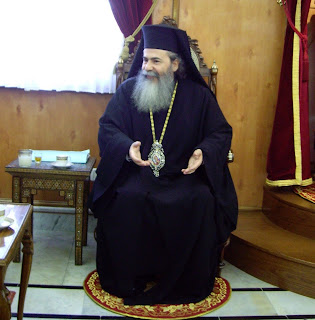 From the Franciscans we went by bus to that other esteemed humanitarian order, the United Nations Office for the Coordination of Humanitarian Affairs (UNOCHA), situated in West Jerusalem. We were expecting an intensive briefing on the situation on the ground in the West Bank and Gaza, but I was not prepared for the harrowing reality to which the multitude of statistics and observations bear witness.
From the Franciscans we went by bus to that other esteemed humanitarian order, the United Nations Office for the Coordination of Humanitarian Affairs (UNOCHA), situated in West Jerusalem. We were expecting an intensive briefing on the situation on the ground in the West Bank and Gaza, but I was not prepared for the harrowing reality to which the multitude of statistics and observations bear witness.UN staffer Ray Dolphin briefed us extraordinarily well on a complex and deep issue; he has also published a book on the Security Barrier, titled The West Bank Wall: Unmaking Palestine (Pluto Press, 2006). Ray is the tall figure in the back row in the photo above.
The full analysis of the political and humanitarian situation in the West Bank and Gaza, of which we received a summary version today, is available on the relevant section of the UNOCHA website, and is well worth an extended browse. But be prepared to be distressed, and perhaps overwhelmed, by the extent of the oppression and suffering being experienced on a large scale by the Palestinian people, as the UN sees it.
Pictured at UNOCHA headquarters in Jerusalem this afternoon (L-R): Rev Rod Benson, Archbishop Phillip Aspinall, Rev Merril Kitchen, Mr Ray Dolphin, Rev John Henderson, Rev Terence Corkin, Rev Gregor Henderson, Mr Lyndsay Farrell, Archbishop Frank Carroll, Mr Kevin Bray.


